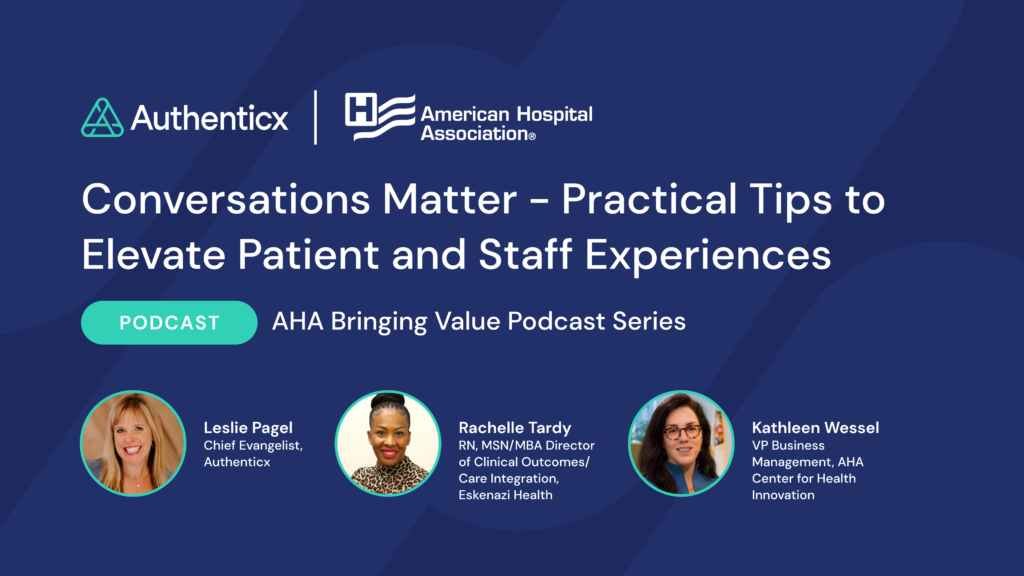Build empowerment in healthcare with customer interactions
Autoscoring uses industry-specific and personalized criteria to audit interactions and evaluate the impact of your customer journey – empowering customers and agents.
Learn More
Actionable customer feedback without survey fatigue. See Authenticx in action:
Enhancing the Patient Experience Through Employee Conversations
First-hand experiences from clients give value to your strategic initiatives. Join Authenticx Chief Evangelist Leslie Pagel and Eskenazi Health on the ‘AHA Associates Bringing Value Podcast’.
Join the Discussion
Empowerment In Healthcare
The phrase “empowerment in healthcare” refers to the practice of helping individuals gain the ability to make decisions and take control of their health and well-being. Patient empowerment has become increasingly important in recent years as healthcare providers strive to provide more holistic patient care. There are multiple important steps to patient empowerment, including providing patients with the knowledge, skills, and resources necessary to make informed decisions about their health and well-being.
The benefits of patient empowerment are numerous. Empowered patients have better access to the information, resources, and services they need to help them manage their health. Empowerment also encourages patients to become active participants in their own care by enabling them to take responsibility for making informed decisions about treatments, lifestyle choices, and other aspects of their health. Empowering patients in their own care can also improve outcomes by engendering closer adherence to treatment plans and better communication between patients and healthcare providers.
Why is patient empowerment important in healthcare? Empowering patients helps them to take an active role in managing their health. Research has shown that when individuals feel empowered they tend to be more engaged in their care, adhere more closely to treatment plans, demonstrate improved communication with healthcare providers, and experience higher levels of satisfaction with their care. Additionally, empowering patients through education can help reduce disparities in access to healthcare and improve the quality of life for those living with chronic conditions or disabilities.
So who exactly should be involved in the process of patient empowerment? Patient empowerment takes a diverse team of people to reach its full potential. A good team should include the following:
- Healthcare providers
- Family members
- Friends
- Caregivers
- Community organizations
- Others as needed depending on the situation
Successfully empowering patients through education and support services requires the combined efforts of many different people and organizations. Healthcare providers must be willing to engage with patients on an individual level so that they can understand each person’s unique needs and preferences when it comes to managing their health. Family members or other caregivers play important roles by providing emotional support and helping to ensure that the patient’s needs are being met appropriately (i.e., advocating for appropriate treatments). Community organizations can provide additional resources such as support groups or educational programs to further empower individuals to manage their health successfully.
The patient empowerment definition provides a crucial component of providing quality care for individuals living with chronic conditions or disabilities. It not only improves healthcare outcomes but also provides patients with a sense of autonomy over their own life choices related to their health status.
Empowerment Approach
The empowerment approach in healthcare is a holistic approach that focuses on the individual, their environment, and their relationships within it. This approach seeks to empower individuals to take control of their own health and well-being by providing them with the tools, knowledge, and support necessary to make informed decisions. The empowerment approach differs from other approaches in healthcare because it emphasizes the individual rather than symptoms or diseases.
Why is empowerment important in healthcare? The World Health Organization (WHO)’s Health Empowerment Theory states that “health is a state of complete physical, mental and social well-being, not merely the absence of disease or infirmity.” When it comes to patient empowerment, WHO is setting the gold standard. This theory serves as a framework for understanding how to empower patients in nursing to take responsibility for their health and well-being. The WHO also developed the Health Empowerment Model, which outlines five core elements of patient empowerment: self-determination, self-efficacy, self-care skills, access to resources, and social support networks. These WHO empowerment elements act as a guide for developing interventions aimed at empowering individuals concerning their health.
Various organizations around the world have developed health empowerment programs as a way of providing individuals with information about healthy lifestyle choices. These programs give patients access to resources such as education and counseling services, often involving group activities such as workshops or seminars where participants learn about nutrition, exercise, and stress management techniques that can help them improve their overall health and well-being.
Patient empowerment is an important part of the broader empowerment approach in healthcare because it encourages patients to become active participants in managing their health rather than remain passive recipients of medical care. Patient empowerment prioritizes the following critical elements:
- Communicating information about treatments to patients so they can make informed decisions about what is best for them.
- Encouraging patient involvement in decision-making.
- Providing opportunities for patients to share feedback.
- Promoting patient autonomy.
- Supporting patient advocacy initiatives, such as campaigns against discrimination or inequality in healthcare.
What Is Empowerment In Health Care?
The term “empowerment in healthcare” refers to the process of enabling patients to take control of their own care and well-being. A philosophy of empowerment involves providing patients with the knowledge, skills, and resources necessary to make informed decisions about their health. It also involves encouraging them to actively participate in care-related decision-making. Patient empowerment is an important part of a holistic approach to healthcare, as it allows individuals to take ownership of their well-being and gain control over the care decisions that affect them.
The patient empowerment model is a framework for empowering patients in healthcare to take control of their own care. The empowerment model focuses on developing understanding between patients and healthcare providers, enabling shared decision-making and allowing patients more autonomy over their care. A successful empowerment model approach emphasizes communication, collaboration, respect for patient autonomy, and shared responsibility, and recognizes the importance of individual preferences in treatment decisions.
To empower patients in nursing practices, providers should educate them regarding health conditions and treatments so they can make informed decisions about their care. Providers should also involve patients in setting goals by asking questions such as “What do you want from your treatment?” or “What are your goals for your treatment?” This makes it easier for providers to understand what matters most to their patients when providing care. Additionally, providers should ensure that they are listening attentively to what their patients have to say so they can better understand how to support them through their care journeys.
By following these steps, healthcare providers can effectively empower patients and provide quality healthcare services that meet each individual’s needs and preferences. Empowerment is essential for improving outcomes in the healthcare system, as empowered individuals are more likely to take ownership of their well-being, thus enabling healthcare providers to offer tailored services based on patients’ individual needs and preferences.
How It Works
Gain a deeper level understanding of contact center conversations with AI solutions.
See a PreviewAggregate
Pull customer interaction data across vendors, products, and services into a single source of truth.
Analyze
Collect quantitative and qualitative information to understand patterns and uncover opportunities.

Activate
Confidently take action with insights that close the gap between your organization and your customers.
Community Empowerment Examples
What is empowerment in health and social care? Community empowerment programs in healthcare can include a variety of strategies to empower patients or families throughout the healthcare process. These programs often focus on patient education, self-management, shared decision-making, and other forms of patient engagement.
What is community empowerment? The importance of community empowerment cannot be understated. One example of a community empowerment program is the Patient Empowerment World Health Organization (WHO) initiative. This program focuses on providing resources and support to help individuals become more actively involved in their own healthcare decisions. WHO patient empowerment provides information about self-care, healthy lifestyle choices, and access to health services. Additionally, it encourages patients to participate in research studies and clinical trials and advocates for improved access to quality healthcare services. World Health Organization patient empowerment aims to get people to take an active role in their own health.
Another one of these patient empowerment examples is the Health Empowerment Initiative developed by the Centers for Disease Control and Prevention (CDC). This program works with local organizations to provide community members with training and resources related to disease prevention and management. It also encourages individuals to become more involved in their own healthcare decisions by offering information about available treatments and preventive measures.
Effective community empowerment initiatives should focus on improving communication between patients and providers — for example, by deploying joint decision-making tools or patient portals for accessing medical records online. The goal of these initiatives should always be to increase patient engagement while mitigating miscommunication between patients and providers.
Advantages And Disadvantages Of Empowerment Approach In Health Promotion
The empowerment approach in health promotion is a strategy intended to improve the health of individuals and communities alike by providing relevant resources, skills, and knowledge. The advantages of the empowerment approach include:
- Increased autonomy for individuals, which can lead to greater self-efficacy.
- Improved access to healthcare services.
- Increased involvement in decision-making processes.
- A better understanding of health issues.
Additionally, empowering communities can lead to stronger social connections and more effective collaboration between various stakeholders, including healthcare providers and community members.
However, there are also some disadvantages associated with the empowerment approach in health promotion. Disadvantages of empowerment in health and social care include:
- Potential conflicts between stakeholders due to differences in values or beliefs.
- Lack of resources or capacity within communities.
- Unequal access to resources or services.
- Potential resistance from those who are not comfortable with change or do not want their power taken away.
Besides these, it can also be difficult for healthcare providers to accurately assess the needs of a community without engaging them directly.
Why is empowering patients important? While there are both advantages and disadvantages to empowerment in health promotion, it is nevertheless an important strategy for providing patients with crucial resources and improving health outcomes for both individuals and communities.